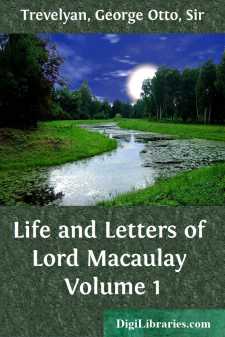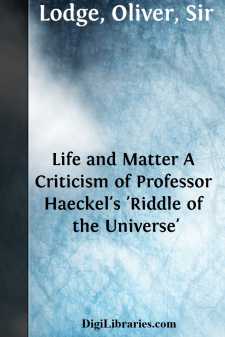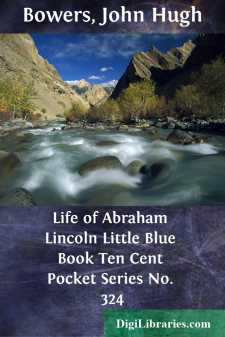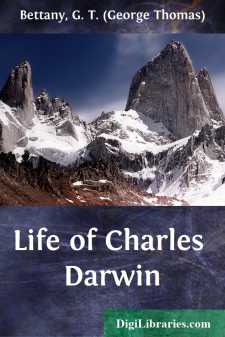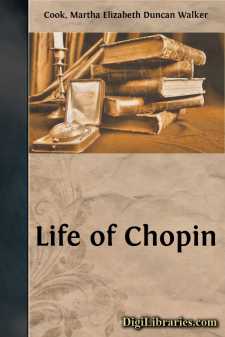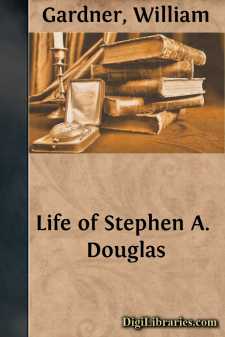Non-Classifiable
- Non-Classifiable 1768
Non-Classifiable Books
Sort by:
CHAPTER I. 1800-1818. Plan and scope of the work—History of the Macaulay family—Aulay—Kenneth—Johnson and Boswell—John Macaulay and hischildren—Zachary Macaulay—His career in the West Indiesand in Africa—His character—Visit of the French squadronto Sierra Leone—Zachary Macaulay's marriage—Birth of hiseldest son—Lord Macaulay's early years—His...
more...
by:
Oliver Lodge
CHAPTER I MONISM In his recent Presidential Address before the British Association, at Cambridge, Mr Balfour rather emphasised the existence and even the desirability of a barrier between Science and Philosophy which recent advances have tended to minimise though never to obliterate. He appeared to hint that it is best for scientific men not to attempt to philosophise, but to restrict themselves to...
more...
Are There More Worlds Than One? Our world is large enough to excite our interest and invite our study until we close our eyes in death. Yet there are countless other orbs scattered through the solar system and throughout the vast stretches of the starry heavens. Some of these worlds are smaller than ours, but the majority of them are hundreds or thousands of times larger. Looking away from our solar...
more...
by:
John Hugh Bowers
LIFE OF ABRAHAM LINCOLN. The story of Lincoln, revealing how one American, by his own honest efforts, rose from the most humble beginning to the most high station of honor and worth, has inspired millions and will inspire millions more. The log cabin in which he was born, the ax with which he split the rails, the few books with which he got the rudiments of an education, the light of pine knots by...
more...
CHAPTER I. If ever a man's ancestors transmitted to him ability to succeed in a particular field, Charles Darwin's did. If ever early surroundings were calculated to call out inherited ability, Charles Darwin's were. If ever a man grew up when a ferment of thought was disturbing old convictions in the domain of knowledge for which he was adapted, Charles Darwin did. If ever a man was...
more...
CHAPTER I. Chopin—Style and Improvements—The Adagio of the Second Concerto—Funeral March—Psychological Character of the Compositions of Chopin, &c., &c. Deeply regretted as he may be by the whole body of artists, lamented by all who have ever known him, we must still be permitted to doubt if the time has even yet arrived in which he, whose loss is so peculiarly deplored by ourselves,...
more...
by:
Sarah Tytler
CHAPTER I. ROYAL PROGRESSES TO BURGHLEY, STOWE, AND STRATHFIELDSAYE. On the 29th of November the Queen went on one of her visits to her nobility. We are told, and we can easily believe, these visits were very popular and eagerly contested for. In her Majesty's choice of localities it would seem as if she loved sometimes to retrace her early footsteps by going again with her husband to the places...
more...
by:
Sarah Tytler
CHAPTER I. SIXTY-THREE YEARS SINCE. The 24th of May, 1819, was a memorable and happy day for England, though like many such days, it was little noticed at the time. Sixty-three years since! Do many of us quite realise what England was like then; how much it differed from the England of to-day, even though some of us have lived as many years? It is worth while devoting a chapter to an attempt to recall...
more...
by:
Richard Garnett
CHAPTER I. John Milton was born on December 9, 1608, when Shakespeare had lately produced "Antony and Cleopatra," when Bacon was writing his "Wisdom of the Ancients" and Ralegh his "History of the World," when the English Bible was hastening into print; when, nevertheless, in the opinion of most foreigners and many natives, England was intellectually unpolished, and her...
more...
by:
William Gardner
Douglas was now at the zenith of his success, master of all his resources, the most admired, dreaded and powerful man in American public life. History must inexorably condemn much of his most brilliant and successful work, but the very emphasis of its condemnation is an involuntary tribute to the matchless efficiency of the man. At this period he was the most masterful and commanding personage of...
more...


